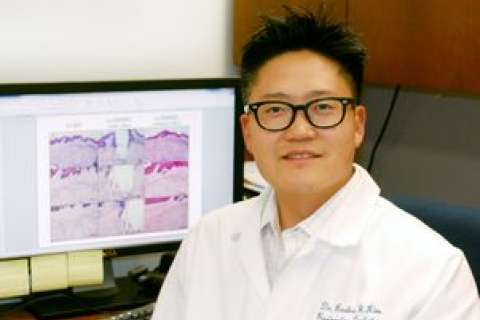
Reuben Kim, DDS, PhD
Languages
Contact Information
Phone
Scientific Interests
Dr. Reuben Kim's research focuses on the mechanisms by which Bmi-1 overcomes replicative senescence but fails to cause immortalization. He is interested in the combined effects of HIV and HPV in oral cancer (HPV-associated malignancies are frequently noted in oral cancer). His focus lies in elucidating the mechanism by which HPV exerts its combined effect with HIV, particularly Tat protein, to induce cancer.
Highlighted Publications
Shin K-H, Kim RH, Kang MK, Kim RH, Kim SG, Kim PK, Yochim JM, Baluda MA, and Park N-H. p53 promotes the fidelity of DNA end-joining activity by, in part, enhancing the expression of heterogeneous nuclear ribonucleoprotein G. DNA Repair (Amst). 2007 Jun 1;6(6):830-40. Epub 2007 Mar 26.
Kang MK, Kim RH, Kim S, Shin K-H, Dimri G, Christensen R, Han T, and Park N-H. Elevated Bmi-1 expression is associated with dysplastic cell transformation during oral carcinogenesis and required for cancer cell replication and survival. Br J Cancer. 2007 Jan 15;96(1):126-33. Epub 2006 Dec 19.
Kim RH, Kang MK, Shin K-H, Oo Zin, Han T, Baluda MA, and Park N-H. Bmi-1 cooperates with human papillomavirus type 16 E6 to immortalize normal human oral keratinocytes. Exp Cell Res. 2007 Feb 1;313(3):462-72. Epub 2006 Oct 28.
Shin KH, Kang MK, Kim RH, Christensen R, and Park NH. Heterogeneous nuclear ribonucleoprotein G (hnRNP G) demonstrates tumor suppressive effect against oral squamous cell carcinoma cells. Clin Cancer Res. 2006 May 15;12(10):3222-8.
Kang MK, Kim RH, Zhong W, Faull KF, Shin KH, and Park NH. Senescence-associated decline in the intranuclear accumulation of hOGG1-alpha and impaired 8-oxo-dG repair activity in normal human oral keratinocytes. Exp Cell Res. 2005 Oct 15;310(1):186-95.
